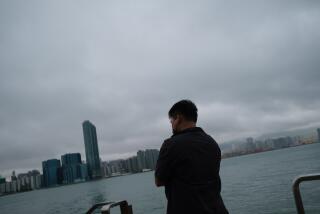BOOK REVIEW / HISTORY : Goodby to Britain’s Last ‘Colonial Spoil’ : A BORROWED PLACE, The History of Hong Kong <i> by Frank Welsh</i> . Kodansha International: $32.50, 625 pages
- Share via
“A Borrowed Place” by Frank Welsh is the ideal reading matter for anyone embarking upon the long flight from LAX to Hong Kong--or, for that matter, anyone who only dreams of jetting to the far edge of the Pacific Rim.
By the end of Welsh’s sweeping history of Hong Kong, the reader will come away with an appreciation of the rich and exotic heritage of Britain’s very last “colonial spoil,” and an understanding of exactly what is at stake as we approach the momentous year of 1997, when Britain’s 99-year lease will come to an end and the flag of the People’s Republic of China will fly over the Crown Colony.
“Many myths have become encrusted around this first foreign encroachment, and have invested the subject of Hong Kong with a powerful emotional charge,” Welsh writes. “The history of the colony is therefore indissolubly with that of China’s relations with the West, and with the development of the West’s attitudes towards China.”
Hong Kong, as Welsh demonstrates, is one of the great oddities of history, a precarious outpost of Western imperialism that has managed to survive war, revolution and day-to-day geopolitical tumult for more than a century. Today, it is the most successful of what Welsh calls “the little Asian dragons,” with a gross domestic product per capita that has exceeded Great Britain’s.
“By this, as by many other criteria,” Welsh writes, “the colony has finally, probably permanently, and certainly unexpectedly quickly, overtaken the ‘Mother Country.’ ”
“A Borrowed Place” spans the long encounter between China and the West, starting with the first Portuguese men-of-war to call at Macao in the 16th Century and running all the way up to the tanks in Tian An Men Square. In that sense, Welsh’s book is not merely a history of the tiny island of Hong Kong; it is a vast tapestry that traces the trajectory of the Western colonial adventure in Asia.
Welsh shows us it was money--and not missionary zeal or manifest destiny--that lured Western imperialism into Asia. First came the conquistadors of commerce in the form of the East India Company, a small army of traders who trafficked in “the national addiction” of the British--tea. Only later did the British start to trade in opium, “the plant of joy,” a practice that led to the so-called Opium Wars of the mid-19th Century. And, fatefully, one of the prizes of war was the Crown Colony of Hong Kong--a font of free enterprise built upon a geopolitical anomaly.
Welsh’s treatment of the Opium Wars is a good example of what he does best as an historian with a special interest in commerce. With impressive clarity--and with a sharp sense of ironic humor--he shows us how the clash between Britain and China had less to do with the opium trade than, among other things, the Irish Question, the affection of 19-year-old Queen Victoria for a British politician named Lord Melbourne, the expense of running the newly established Penny Post, the riotous demand of the Chartists for electoral reform, and the designs of the French on the Turkish Empire!
Welsh displays a certain charming crankiness and a healthy dose of English eccentricity throughout his ambitious book. For example, he is still not entirely reconciled to the “retrocession” of Hong Kong by Great Britain to China, and he suggests that outright sovereignty was once a tantalizing alternative: Hong Kong, he argues, has achieved the status of “an independent city-state, with something resembling a genuinely national identity.”
British diplomacy, according to Welsh, lacked the courage and the vision that would have been required to achieve independence in the face of a grimly determined China.
“At bottom Britain was not prepared to fight it out,” he writes. And even the “prudent businessmen” of Hong Kong, he concedes, shared the same “inglorious but realistic attitude.” But Welsh betrays his own disappointment at the timid and fainthearted diplomats who are parlaying with China over the fate of Hong Kong.
“The lack of candour and firmness with which the retrocession of Hong Kong to China has been handled,” he observes in passing, “has aroused disillusion sometimes amounting to disgust.”
Welsh, an Englishman by birth and a banker by vocation, possesses an impressive gift for bringing wit and insight to the sometimes tedious subject of commerce. Never before have I encountered such wry humor and such sheer savvy in a book that includes, for example, charts and graphs comparing the relative importance of land taxes and pilgrim revenues in budget of 18th-Century Bengal.
Given his eye for the curiosities of history, his taste for the quaint and the exotic, and his sheer genius at describing how things actually work in the real world, I was not surprised to discover that one of Welsh’s earlier books is devoted to the finer points of building the ancient Greek man-of-war vessel known as a trireme . And, as soon as I turned the last page of “A Borrowed Place,” I set out to find a copy.
More to Read
Sign up for our Book Club newsletter
Get the latest news, events and more from the Los Angeles Times Book Club, and help us get L.A. reading and talking.
You may occasionally receive promotional content from the Los Angeles Times.










